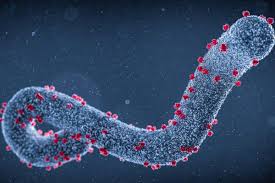Marburg Virus Disease : Outbreak

Rwanda has successfully contained and declared its first-ever outbreak of Marburg Virus Disease (MVD) officially over after a 42-day period without new cases. This achievement was confirmed by the World Health Organization (WHO).
- MVD is a severe and often fatal hemorrhagic fever caused by the Marburg virus, with no approved vaccines or treatments currently available.
- It was first identified in 1967 in the German city of Marburg. It is named after an outbreak linked to laboratory workers exposed to infected green monkeys imported from Uganda.
- Most outbreaks have occurred in sub-Saharan Africa, including countries like Tanzania, Uganda, Angola, Ghana, Kenya, and Zimbabwe.
- Initially transmitted from fruit bats (Rousettus aegyptiacus) to humans. It can spread occurs through direct contact with bodily fluids of infected individuals or contaminated surfaces.
- Symptoms:
- Early signs: High fever, severe headache, and malaise.
- Advanced stage: Severe bleeding, liver failure, multi-organ dysfunction, shock, and death within 8-9 days of symptom onset.
- Fatality rate: The average case fatality rate is approximately 50%, varying from 24% to 88% depending on the virus strain and case management.
- Diagnosis: Confirmed through RT-PCR (Reverse Transcription Polymerase Chain Reaction) tests and virus isolation procedures that require maximum biohazard containment.
- Treatment: No specific treatment exists. Supportive care includes rehydration, electrolyte replacement, and symptom management, improving survival chances.
- Promising vaccines, such as the Sabin Vaccine Institute’s single-dose vaccine, are under Phase 2 trials in Uganda and Kenya. Rwanda also received investigational vaccines to support outbreak control.




